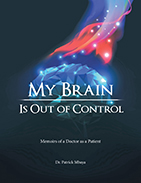
 |
For readers in love with Nova, Discover, or any other popular science magazine, Mbaya's book detailing his brain infection and recovery will not disappoint. "The brain can be described as the computer of the body," Mbaya initially explains. He continues by detailing the workings of the brain, in layperson terms, and what went amok when he acquired a brain infection in his left frontal cortex. It is unusual for a doctor to have firsthand experience as a patient and be articulate and interested in sharing his perspective. While most physicians might already understand the biology of neurological disease, they might benefit from reading about how neurological illness affected Mbaya's emotional state.
Patients and their loved ones will likely also find My Brain is Out of Control inspiring. Mbaya benefits from being a remarkably patient patient during his long recovery, which serves as an excellent example for other recovering patients as they go through any form of frustrating rehabilitation. As a psychiatric physician, Mbaya is obviously an intelligent and insightful person. But, some brilliant people are unable to explain the basics of their professions without bogging readers down with jargon and complex concepts; not so this author. He shares his most personal experiences and frustrations and the underlying biochemistry in a readable, fluid way.
Mbaya explains current understanding about neurotransmitters (brain chemicals) and their affects on mood and outlook. Fascinating is his account of diurnal variation, wherein his depression and despair were notably worse in the mornings. His speech worsened throughout the day, but his mood usually elevated as the afternoons wore on. Writing a personal account of a severely stressful experience is difficult at best. Kudos to Dr. Mbaya for writing his fascinating and personal narrative, helping the public to better understand neurological disease, some forms of depression, and the recovering patient.